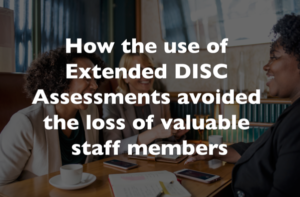Understanding motivational issues in a DISC profile is essential when assessing employee performance and role satisfaction. Jack (not his real name) appeared to be a contented manager who completed his duties reliably, but he did not demonstrate the drive or initiative the company expected from a future leader.
Background on the Role and Expectations
Management had originally identified Jack as someone with leadership potential. Over time, they became disappointed that he was not performing at the expected level. Although he performed the tasks listed in his job description, he did not show the initiative or motivation the Managing Director anticipated.
Jack had been recommended by a recruitment agency based on his qualifications and experience. However, the selection process did not include a behavioural assessment. A DISC assessment would not have changed the decision to hire Jack, but it would have helped leadership understand his motivational drivers, natural strengths, and development areas.
Why the DISC Profile Was Needed
During the annual performance review, the Managing Director engaged a Human Resource consultant who recommended using Extended DISC® assessments, not only for Jack but for the entire organisation of more than 300 employees. This created a valuable reference point for future HR decisions.
Jack’s Extended DISC® Behavioural Assessment revealed significant issues. His profiles are shown opposite. The results indicated uncertainty about his role, insecurity, and internal frustration. The Managing Director had not recognised these signs, although he had noticed that Jack seemed to operate “on automatic.”

Key Insights From the DISC Assessment
The behavioural assessment helped explain Jack’s low motivation. With support from the HR consultant, the Managing Director revised Jack’s job description to match the motivators identified in his DISC profile. Jack needed more independence, involvement in planning and strategy, and responsibility for analysing results rather than only reporting upward.
The report highlighted that strict rules and limited control reduced Jack’s motivation. The Managing Director had unintentionally added pressure by frequently intervening, believing it would help Jack develop. In reality, Jack needed autonomy and trust to thrive.

Implementing Changes to Support Jack’s Motivation
A change in focus and approach produced an immediate improvement. A follow-up report completed six months later revealed the Profiles shown opposite.
By redesigning Jack’s responsibilities according to his natural strengths, the organisation saw a rapid change in his attitude and performance. Development areas were addressed with targeted support from the Managing Director.
Outcome: Stronger Motivation and a New Leadership Role
Jack was eventually promoted to General Manager and now works closely with the Managing Director in a role that suits his qualifications, experience and, importantly, his natural behavioural style. By understanding motivational issues in a DISC profile, the company helped Jack unlock his full potential.
Want to Unlock Your Team’s Real Motivation?
Use DISC Assessments to identify what drives each employee and design roles that support long-term productivity and success.







